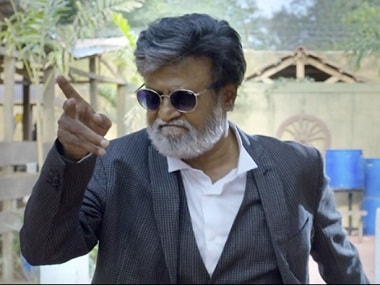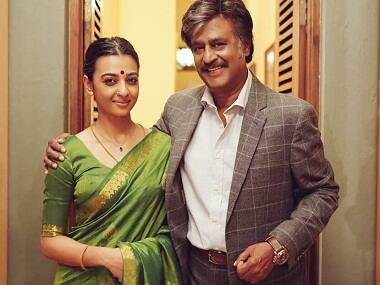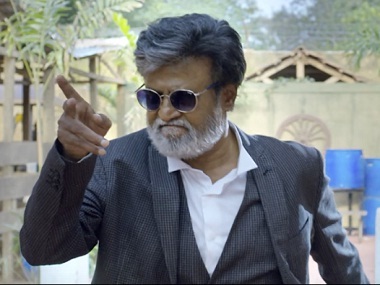The year is 1995 and A.R.Rahman has just produced what will arguably be the best introduction song for superstar Rajinikanth in the next two decades. The song is ‘Oruvan Oruvan’. It is Rahman’s sixteenth Tamil film, Muthu, and it’s the biggest soundtrack of his career yet. Because it is a Rajinikanth film.
Cut to twenty one years later, a thirty second teaser video set to a grungy guitar riff has taken Youtube by storm, breaking records within an hour of its release. It is Santhosh Narayanan’s fifteenth Tamil film as composer, the biggest of his career yet. Because it is a Rajinikanth film.
More recently, at the audio launch of Kabali, the pressure is immense. Will our favourite playback singer croon the traditional Rajini intro song while we conjure it in our minds? What will the romantic duet be like? Will there be a fight sequence song? Our expectations of our artists are huge, sometimes bordering on unreasonable, especially when it comes to our matinee idols. A project like Kabali could make or break a composer’s career. So, what does Santhosh Narayanan do?
[caption id=“attachment_2910420” align=“alignleft” width=“380”]
 Rajinikanth in the song ‘Neruppu Da’ in ‘Kabali’[/caption]
Rajinikanth in the song ‘Neruppu Da’ in ‘Kabali’[/caption]
He goes ahead and breaks every stereotype associated with a Rajini soundtrack. The big names so to speak, are nowhere to be seen in the track list. The two melodies seem to have a pensive, brooding quality about them, very unlike the song and dance duets one would expect in a Rajini movie.
The first person narrative is missing from the introduction song, ‘Ulagam Oruvanukka’. Instead, it is sung by a chorus of men, a rousing paean celebrating the return of their beloved Kabali.
But wait, there is that song from the teaser, ‘Neruppu Da’ that everyone is losing their marbles over. Maybe that is the real introduction song, you wonder. But then what about the laid back gangsta rap, ‘Veera Thurandhara’? It’s the kind of intro song any gangster would kill to have, pun intended. So what exactly has Santhosh done here?
As you listen to the soundtrack, you slowly begin to realise that this is no ordinary template “album” with six songs. Instead, the music seems to have been composed as a commentary on the happenings in the film.
Santhosh Narayanan could have chosen the easy way out, creating pop-sy numbers with big names and the album would no doubt have done well, riding on the star power. Instead, he has chosen to stay true to the story and its creator’s vision. Much like Rajinikanth himself has, we come to realise after the watching the film. And in doing so, Santhosh has unearthed some of the finest contemporary talent and put them under the spotlight.
We only need to look into a few of Santhosh’s past projects to understand that he is a director’s composer. His music is driven by the characters in the film, their emotions, the situations they are in, what they do, and what they feel. He creates a motif for every character of consequence, weaving the music intricately into the character’s very identity.
[caption id=“attachment_2906260” align=“alignright” width=“380”]
 Radhika Apte stars with Rajinikanth in ‘Kabali’[/caption]
Radhika Apte stars with Rajinikanth in ‘Kabali’[/caption]
Thus, when an angst ridden Kabali reminisces about Kumudhavalli, you do not hear the song that is ‘Vaanam Paarthen’ in the album. You hear Kabali’s inner voice. When the father-daughter reunion happens, what you hear through Dhee’s voice are the unspoken words between Yogi and her father, the questions waiting to be asked once the slow motion bullets fade to black. When you hear the whistle theme, a clever nod to Morricone, you imagine the shudder it must send through Kabali’s enemies.
It comes as no surprise to me that the music of Kabali has topped the charts, breaking records across streaming services and for the music label. The music comes from an intelligent, sincere and collaborative mindset. Intelligent enough to lend the Hindi version of ‘Maya Nadhi’ authenticity by including a subtle tabla layer, or to adapt the Gangsta rap genre to suit the Malaysian milieu.
Sincere enough to keep adding dimensions to the soundtrack without going overboard, exercising restraint where needed and giving the music a life of its own while staying true to the screenplay. A collaborative mindset that is exemplified by the employment of artists such as Pradeep Kumar and Kalyani, themselves musicians par excellence, towards string and additional arrangements.
If Kabali is supposed to be the album of his career, then Santhosh Narayanan has sure delivered music befitting of it. But something tells me this is just the beginning. And there is much more ‘Magizhchi’ to be had in the years to come.
Disclosure: The writer was associated with the music of Kabali, having made a tiny contribution to the song ‘Neruppu Da’.
)